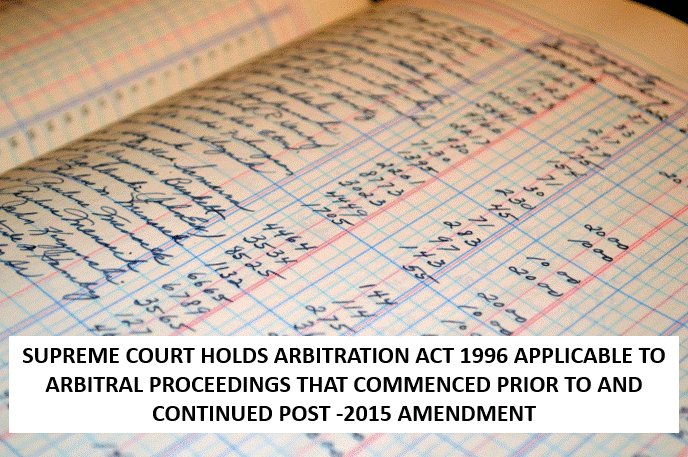SUPREME COURT HOLDS ARBITRATION ACT 1996 APPLICABLE TO ARBITRAL PROCEEDINGS THAT COMMENCED PRIOR TO AND CONTINUED POST -2015 AMENDMENT
A two Judge Bench of the Supreme Court comprising of Justice M.R. Shah and Justice C.T. Ravikumar passed a Judgment dated 09.05.2023 in the case of ‘M/s. Shree Vishnu Constructions vs The Engineer in Chief Military Engineering Service & Ors, Civil Appeal No. 3461 of 2023’ and observed that when a notice invoking arbitration is issued by a party under the Arbitration and Conciliation Act,1996 (1996 Principal Act) and an application for appointment of an arbitrator is made under the Arbitration and Conciliation (Amendment) Act, 2015 (“2015 Amended Act”), the provisions of 1996 Principal Act would be applicable to such case.
Facts:
In the present case, one, M/s Shree Vishnu Constructions (“Applicant”) entered into an Agreement dated 06.10.2010 (“Agreement”) with the Commander Works Engineers (Air Force), Bowenpally, Secunderabad and other concerned Authorities (“Respondents”) for construction of two blocks of Admin-cum-Technical Accommodation in an RCC (Reinforced Concrete Cement) framed structure with PCC (Pre-stressed Concrete Cement) solid block masonry along with related services.
During the contractual period, the Respondents had requested certain modifications and accordingly, the Applicant carried them out as per their instructions.
However, owing to delay in releasing the payments for the modified work done by the Applicant, a dispute arose between the Parties. According to the Applicant, the Respondents continued to delay the payments on the ground that the items used for the modifications were not the planned items.
The Parties tried to settle the dispute amicably, but when the said amicable settlement failed, the Applicant issued a Notice dated 20.12.2013 under the provisions of the 1996 Principal Act, to the Respondents, thereby invoking the Arbitration Clause in the Agreement and further, sought for appointment of an arbitrator. However, the Respondents failed to reply to the said Notice.
Hence, the Applicant filed an Arbitration Application bearing ARB. APPL. No. 151 / 2016 (“Application”) dated 27.04.2016 before the High Court for the State of Telangana under Section 11 (6) of the 1996 Principal Act (Appointment of Arbitrators) seeking appointment of an Arbitrator for the resolution of dispute.
High Court:
The High Court, vide Order dated 30.06.2020, dismissed the Application filed by the Applicant on the grounds that the Respondents had successfully established that they had made the payments to the Applicant towards full and final satisfaction of the amount payable under the Agreement and further, produced a ‘No further claim’ certificate that the Applicant himself had signed and issued during the final bill payment. Therefore, the High Court held that there was no need to refer the matter for arbitration as an arbitral dispute did not exist.
Aggrieved by the High Court Order dated 30.06.2020, the Applicant filed a Civil Appeal No. 3461 of 2023 before the Hon’ble Supreme Court seeking an order to refer the matter to arbitration as per the provisions of the 2015 Amended Act.
Supreme Court Analysis:
The Apex Court passed a Judgment dated 09.05.2023 and made the following observations-
(1) That in the present case, a Notice dated 20.12.2013 was issued by the Applicant to the Respondents under the provisions of the 1996 Principal Act, thereby invoking the Arbitration Clause in the Agreement.
(2) That as per Section 21 of the 1996 Principal Act, the arbitral proceedings in respect of a particular dispute commences on the date on which the respondent receives a request to refer the dispute to arbitration. Section 21 of the 1996 Principal Act is reproduced below for easy reference:
Commencement of arbitral proceedings.—
Unless otherwise agreed by the parties, the arbitral proceedings in respect of a particular dispute commence on the date on which a request for that dispute to be referred to arbitration is received by the respondent.
(3) Thus, the arbitral proceedings in the present case is deemed to have commenced around 20.12.2013, when the Applicant issued the Notice to the Respondents seeking appointment of arbitrator to resolve their disputes.
(4) Further, in the case of ‘Board of Control for Cricket in India Vs. Kochi Cricket Private Limited and Ors. (2018) 6 SCC 287 (BCCI Case), the Supreme Court had observed that the 2015 Amended Act is prospective in nature and does not apply to arbitration proceedings that had commenced prior to the 2015 Amended Act.
(5) Thus, applying the aforesaid principles of law to the present case, it is established that the 2015 Amended Act would not apply to the arbitral proceedings that had commenced around 20.12.2013, i.e. much before the Amendment came into force. As a result, the 1996 Principal Act was held applicable in the present case.
(6)The Bench further observed as follows:
It is observed and held that in a case where the notice invoking arbitration is issued prior to the Amendment Act, 2015 and the application under Section 11 for appointment of an arbitrator is made post Amendment Act, 2015, the provisions of pre-Amendment Act, 2015 shall be applicable and not the Amendment Act, 2015.
(7) Further, the Bench upheld the High Court Order dated 30.06.2020, that clearly observed that there was no dispute existing between the Parties, as the full and final payment was made by the Respondents and the Applicant had signed the ‘No further claim’ certificate as well. Hence, there is no requirement to refer the matter to arbitration.
Conclusion:
Thus, based on the aforesaid observations, the Apex Court held that the 1996 Principal Act would be applicable to the arbitral proceedings that commenced prior to the 2015 Amended Act and further, held that it was not required to refer the matter to arbitration, as no dispute existed between the Parties. As a result, the Supreme Court, vide Judgment dated 09.05.2023, dismissed the Civil Appeal No. 3461 of 2023 and upheld the High Court Order dated 30.06.2020.
Shalini Donthi
Legal Associate
The Indian Lawyer





































Leave a Reply